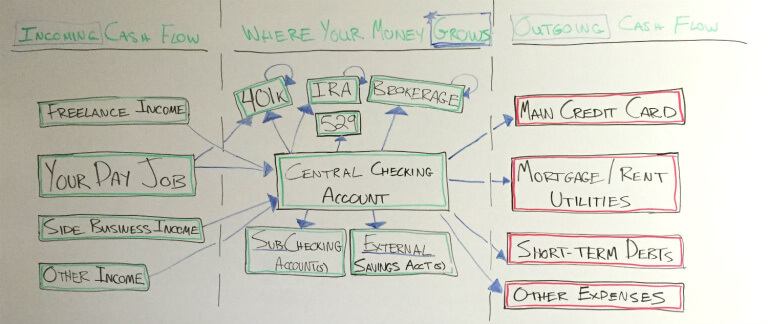Seven Super Silly Ways People Try to Save for the Future

It blows my mind, that with all of the really simple and very stable ways to grow money over time, such as 401k plans, 403b plans, health savings accounts, and IRAs, that people do anything else with their money to try to save for their future.
Sure, there are other ways out there, but in terms of simplicity and a hands off approach, those are as simple as it gets.
If you’ve been following the blog a while, you know I rarely miss an opportunity to poke fun at some of the silly things people do, and this is no different. Hopefully you’re not doing any of these things with your future savings. If you are, maybe it’s time to make some simple calculations, and re-consider how quickly that money can grow.
Here are seven silly ways people try to save for the future.
Straight Cash Homie
Yes, some people just keep physical cash and think this is going to be their retirement money. Aside from the fact it could get stolen, burned, or misplaced, this cash will do nothing but depreciate over time as inflation occurs. And this happens at a pretty alarming rate year over year.
Just think back when you used to pay $5 for your lunch that now costs $7.50. That’s your cash depreciating plain and simple.
If you don’t believe me, check out this inflation calculator that shows you how past money compares to today’s money.
Aside from spending cash, stockpiling it without some way for it to grow is one of the worst things you can do to save for your golden years. Cash for spending and emergencies is fine, but don’t expect to retire on it.
CDs, Money Market, and Interest Bearing Accounts
These types of accounts are just a step above cash. Banks try to bait you into signing up for them by giving you measily $100 bonuses. Don’t fall for it. At most, they’ll gain something like 1% a year, not even enough to keep up with normal inflation.
Again, these are good for spending money to mitigate a little bit of inflation, but they shouldn’t be relied upon for any sort of growth. Only use these options if you need to keep your money 100% safe from loss, as you might when you already have a huge nest egg and you need to protect it from volatility.
Government Bonds
Some government bonds can make you a little bit of money, and they generally aren’t taxed, but you’re not going to get rich from these either with them normally capping out at a 2-3 percent returns. Some are more aggressive, but generally this is another investment type that you would use if you are protecting money in your later years.
Real Estate “Investing”
For some reason people think that if they own a house, they’re going to be able to sell it and retire from the profits when they’re ready to stop working.
Real Estate simply doesn’t appreciate that quickly, or all that much. Some of it even depreciates.
I don’t know if this fallacy is from mortgage propaganda or what, but it’s just not true. Beyond what you pay in interest, a house costs a lot of money to live in and maintain over time, and can end up getting you into a huge amount of long-term debt.
It’s generally not a good investment unless you actually approach and manage it like an investment asset (collecting rental income, buying low and selling high, flipping, etc).
That said, you can make a lot of money with real estate investing if you study it and do it correctly. The caveat is this is something you have to be really good at. You have to actively keep up with it. You have to study markets. You have to know how to spot deals and understand the risks of the markets and deals you’re getting into. You have to be a landlord in a lot of cases, which is totally fine, but can be a pain in the neck as well.
It’s something that takes a lot of work, requires a lot of time and up front money to do correctly, and isn’t for the faint of heart.
More power to you if you can do this successfully. It’s something I may get into in my lifetime, but it’s definitely not going to be passive and hands off monetary growth immediately like a 401k can be.
I’m not arguing against buying a house or getting into real estate investment to be clear. I’m arguing against doing either as a novice and expecting it to make you rich. 🙂
Lottery Tickets
There are literally hundreds of billions of dollars a year spent on lottery tickets. Yes, I said billions, not millions.
I can’t count the number of times I’ve impatiently stood behind people at the gas station while they buy dozens of different types of lottery tickets with the wadded up extra cash in their pockets.
Can you imagine if all of this money, or even 1/10th of it was invested how much it could be worth? It’s staggering.
Yet people still do it. Ask any person you know that normally plays the lottery if they think they’ll win in their lifetime. They’ll probably answer yes. They’ll justify it by saying, “if I play long enough, I have to win.” A ridiculously high percentage of people actually believe this.
Either that or they’ll lie to you and say no, and keep on playing. Many of these people are banking on the lottery to fund their retirement, to various degrees. Some may contribute to a retirement account (as their back up plan?), but still spend hundreds or thousands a year on the lottery, but some may not be invested at all, carelessly running through losing lottery tickets. They might as well be burning their money.
Sure, some people just do it for the fun, entertainment, and fantasy factor that comes with it, and I get that. But there are a lot of people that genuinely are relying on this “tactic” alone to retire. These people will be asking their kids and family members for money in 20 years, literally.
Don’t let this be you. Even just $25 a month is enough to make over $57,000 over the course of a 401k’s lifespan. Use our savings and investment calculator to figure out how much you can save.
Social Security
If left alone, the Social Security program as we know it will run out of money in 2035, which is not really that long. Basically, if you’re still working at all as I write this post, that will likely be in your lifetime, much less if you are young. If you’re young, you might as well kiss social security goodbye.
Now, it’s pretty likely something will be done to change that, but that’s not a sure thing. Personally, I’m not going to count on anything at all to be there when I retire. If it is and I do end up getting that income stream, that’s just going to be a bonus for me.
Bottom line is, don’t count on money you don’t have control over. It can be taken away from you at any given time.
Phantom Money That Is Just “Supposed to Be There” aka Not At All
And then there’s the last one. That magical phantom income stream that people just assume will be there when they get older. They don’t have a plan to create it. They’re not working towards it. They don’t have a relative that they’re waiting on to inherit money from. They’re not working to decrease their expenses or pay off debt.
They just think.. “Well, someone will take care of that for me, right?”
Wrong… Unless you’ve specifically hired someone, no one is sitting at a desk planning on how to handle your financial future. If you have debt to pay off, that’s on you. If you have expenses to decrease, that’s on you. If you’re going to need an income stream of some kind when you finally stop working, that’s on you.
And that’s really what we’re talking about here. Accountability and control. If you have a specific future painted for yourself, that’s on you to figure out, and the sooner you start working towards that the sooner it will be a reality.




